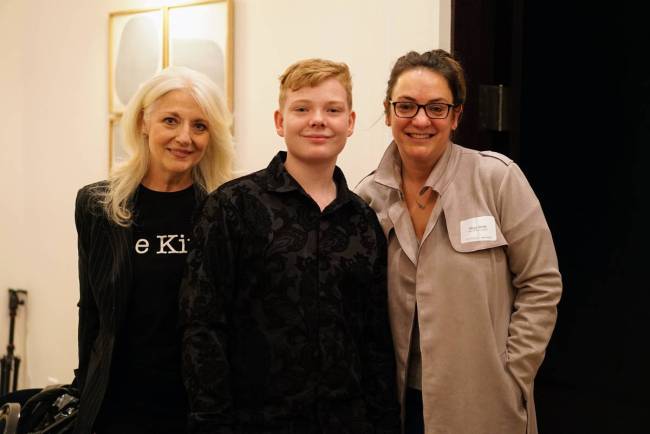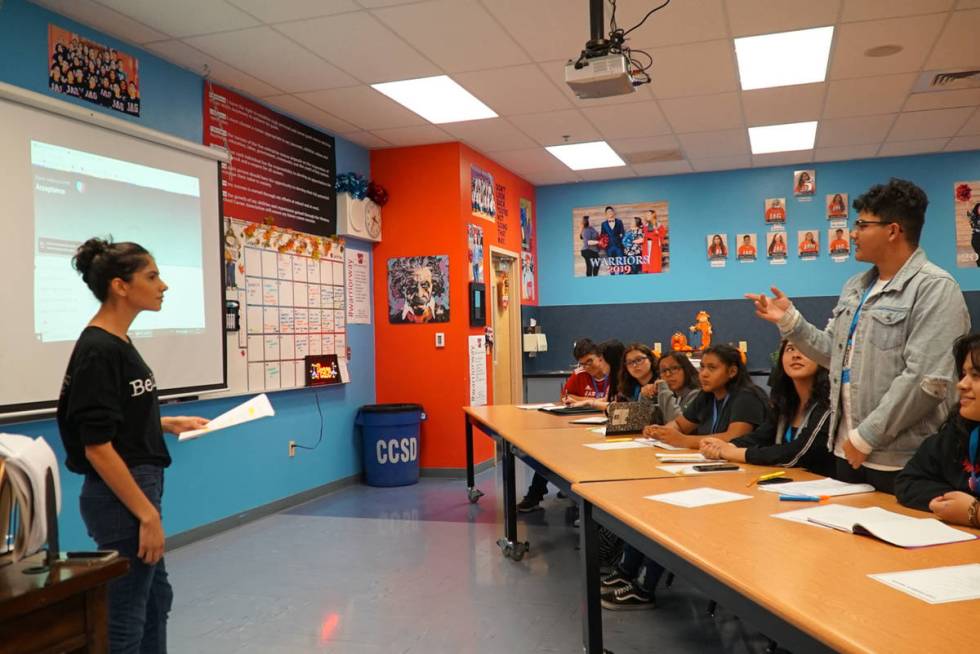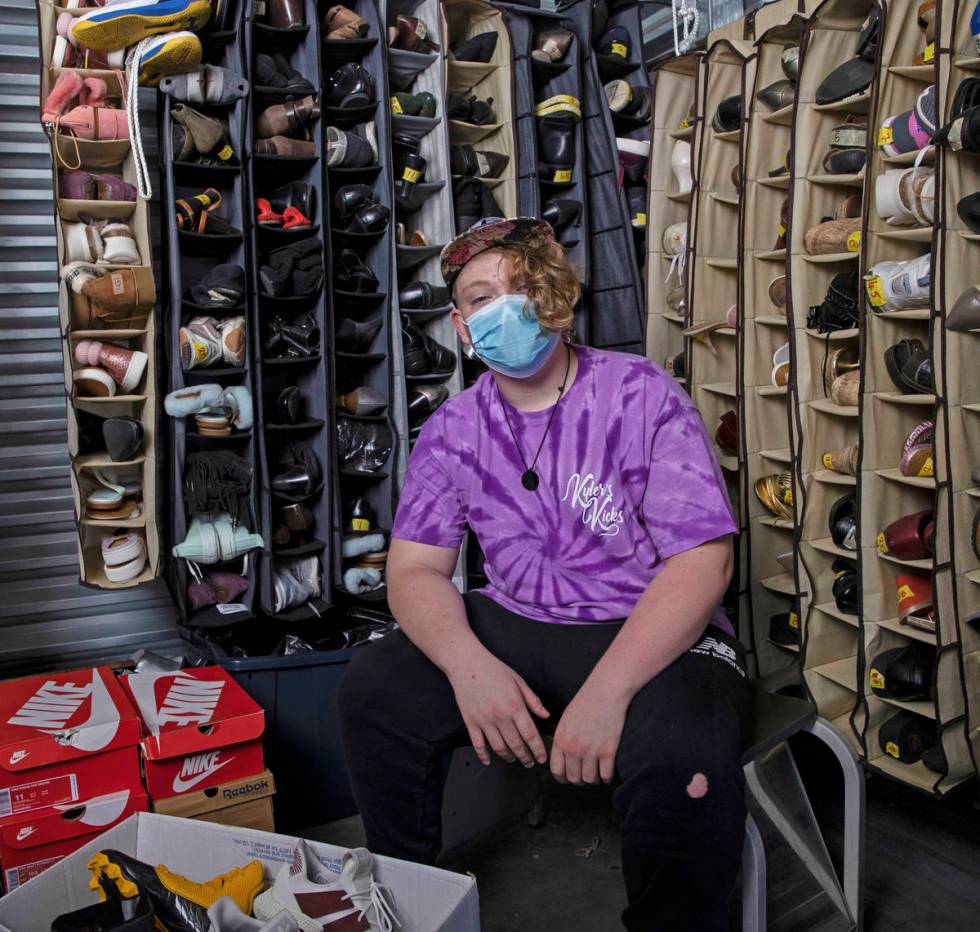Lady Gaga’s foundation spreads message of mental wellness, support among local youth
In October 2018 when Lady Gaga co-wrote an op-ed on suicide for The Guardian newspaper, one that implored the world to take mental health seriously, her Born This Way Foundation already was in Las Vegas, working on mental wellness with teens and partner organizations.

When Gaga goes on tour, so does Born This Way. The nonprofit for youths, founded in 2012 by Gaga and her mother, Cynthia Germanotta, invited concertgoers in each city onto the Born Brave Bus to learn about creating a “kinder, braver world.” It also connects them with community resources by providing stations at the concert’s entrance. One concert tour offered pre-show counseling by mental professionals.
“What we were excited about for Las Vegas is getting to stay there, getting to set up shop, build relationships and be there for more than a night or two,” Born This Way executive director Maya Enista Smith says.
She has gotten to know local change-makers and is aware of Las Vegas’ poor rating on the national index for mental health. “The tone from the start of the foundation has been one of aspiration, young people envisioning a world that is not yet possible, and working everyday toward building it.”
Suicide is a major public health problem and a leading cause of death, according to the National Institute of Mental Health. Though Nevada’s suicide rate has stabilized in the past two decades, it is nearly double the nation’s rate and is dead last on Mental Health America’s 2019 state ranking for prevalence of mental illness and lack of access to care.
(If you or someone you know needs help, contact the National Suicide Prevention Hotline at 800-273-8255.)
“It’s OK to not be OK” is the stigma-conquering mantra Born This Way uses. It partnered with the National Council for Behavioral Health to bring teen Mental Health First Aid to the U.S. where in-person training programs and a step-by-step action plan teaches young people how to recognize mental health or substance abuse issues in friends and get them to an adult.
Valley High was one of eight schools selected nationally to pilot the program.
With the school’s high percentage of homeless students, a 100 percent free or reduced-price lunch program, and transient student body (one-third of it coming and going throughout the school year), staff already is trained in trauma sensitivity. Mental health counseling is offered at the school’s wellness center. Student training in a form of mental health CPR was the next step. The entire school completed the program in 2019.

“What a difference it did make for our students,” says Ramona Esparza, principal at Valley, where staff learned early on that unless mental health challenges were addressed it was difficult for students to improve academically.
Because of the training, Esparza says, “Our students are very inclusive now. They see a peer in need, they get them to an adult.”
Fifteen-year-old Kyler Nipper sees so much value in that approach.
In sixth grade he was bullied for his walk and his plain shoes and stabbed with a pencil by a student at school in Colorado Springs — puncturing his lung, landing him in the hospital and leaving him with PTSD. After emergency surgeries, he received a pair of new shoes from another student. It was a gesture of kindness that transformed his entire outlook. Now a Las Vegas resident, Nipper has distributed more than 30,000 shoes to those in need through his nonprofit, Kyler’s Kicks, and through his Kyler’s Kicks Lounge in the Arts District.
“My advice is to spread kindness,” he says. “All it takes is one person.”

It’s people like Nipper that make Las Vegas such an inspiring community, Enista Smith says. She sees change-makers as the answer to altering that narrative of mental wellness in Las Vegas, even with Born This Way’s commissioned study that surveyed 400 youths, finding that nearly 90 percent of the teens viewed mental health as a priority topic, but less than half rarely or ever discuss it with others; 1 in 4 say youth lack access to supportive mental health resources in the community.
That’s because on the ground Enista was seeing something else. “There is a hope and a problem solving that is really going to change that,” she says. “We’re seeing innovation, creativity and urgency to address those issues.”
While the pandemic has had an affect on some of the nonprofit’s efforts, it has not ended its Las Vegas programs. That includes #BeKind21, which invites 21 days of kindness in September, and its Channel Kindness Awards, as well as partnerships here.
In its Las Vegas residency, Born This Way has hosted service projects and kindness projects and Enista Smith, who spoke at Moonridge Foundation’s Annual Philanthropy Leaders’ Summit, invited Moonridge’s CEO and principal Julie Murray to a U.N. Summit addressing mental health.
Born This Way is one of many partners in Hope Means Nevada, an organization that Murray co-chairs (and founded with the late Eric Hilton), to raise awareness about mental health and teen suicide. It uses metrics from Nevada Medical Center. Murray says that between the pandemic and the economy, she is finding more urgency about mental health awareness than ever, and that as a Las Vegan, she’s never seen the community this hurt.
But like Enista Smith, she sees important change coming from youth on mental wellness: “The teens are standing up and saying ‘This is not what we want for our community,’ ” she said.
And then there is Kyler Nipper, whose own trauma, like Lady Gaga’s, inspired a movement.
“It’s important to stay positive,” Nipper says. “Just never give up. This isn’t the end of your life, this is only one little chapter. All my dreams came true. We’re changing the world.”
This story has been updated to correct Maya Enista Smith’s name.
Mental wellness and Las Vegas youth
Born This Way Foundation commissioned a study by Benenson Strategy Group that surveyed more than 400 Las Vegas-area youth, ages 13 to 24, about mental wellness and access to services.
— Nearly 90 percent see mental health as a priority, but half say they rarely or never talk about it.
— More than 1 in 4 youths say that young people in Las Vegas rarely or never have access to the resources they need to support their mental wellness or address a mental health issue.
— 83 percent say they are interested in learning coping skills.
— LGBTQ+ youth are less likely than their non-LGBTQ peers to rate their mental health highly and are much more likely to report feeling helpless or sad, anxious, or fearful. They arre less likely to talk about their mental health with a parent or guardian.
Channel Kindness
A digital platform where people and organizations share inspirational stories of kindness, deeds and projects that help others, whether at home, school, work or avenues of daily life. They tell of how they are kind to their bodies, create safe spaces for LGBTQ people or challenge the stigma of mental illness.
Awards are offered to youth for their ideas designed to inspire kindness and mental wellness in their communities. channelkindness.org
#BeKind21
Launched in 2018, #BeKind21 encourages participants to practice a kind act each day during the first 21 days of September.












